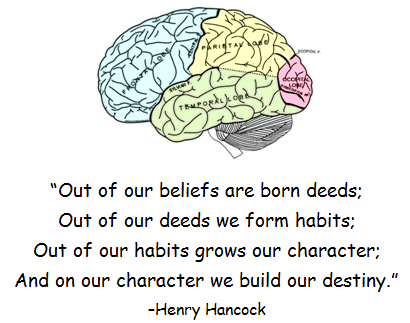Habits of Mind and the Brain

Our five senses gather information daily. We do not pay close attention to much of what is incoming to the brain because we do not need to. Sitting in a coffee shop, we see people, things, colors, movement, sunlight. We hear the swooshing noises of the coffee machines, the chatter of other patrons, and the clatter of dishes. We feel how hard or soft the chair is, the warmth of the room, the comfort of a sweater, the smoothness of the coffee cup, the crumbs falling from a pastry. However, we are probably paying more attention to the flavor of the coffee and how hot or cold it is, and to the sweet taste of the pastry than to all of the other things around us.
Some of us really enjoy the ambiance of a coffee shop. Even though the brain is taking in a tremendous amount of information about the things going on around us through our senses, we can choose to focus our attention on our food, our drink, and our conversation with a friend. What the brain can do is really amazing.
We discussed what happens in the brain as we learn in the previous blog. To recap, when we learn something new, we concentrate carefully and pay attention to the details of how to do the new task. As we learn something new, the brain creates a pathway and builds connections so we can remember the new information. As we repeat the activity, the path becomes greased so that we can perform the job more easily. Experiences change the brain.
If we learn how to do something the wrong way, and we repeat it enough times, it becomes very difficult to change the wrong learning. The path for the wrong action has become part of our automatic behavior. It has become a habit.
A couple of years ago, I sewed cloth bags to carry my groceries in so that I could use fewer plastic bags. I hung them on a hook by the front door thinking I would remember to take them with me—but I almost always forget. My habit is to grab my purse and the grocery list and go. I never think about the bags until I am at the checkout. To change my long-standing habit, I need a stronger reminder. Maybe I should write “Take Bags” at the top of my grocery list.
Habits are difficult to change because of how our brains work. Once an action or a thought pattern becomes automatic, we do it without thinking. In order to change a habit, we have to want to change it, we have to consciously think about it to stop the automatic response, we may need a visible reminder to change, and we have to work hard to learn to do it a different way.
It is important to give correct guided practice to students before we require independent practice. For example, a student may hold a pencil incorrectly, perhaps because no one noticed him doing it wrong. Writing may then be very tiring, but a student will find it difficult to change the way he holds the pencil because it has become automatic—it is a habit. What we do repeatedly becomes a part us and because of how the brain works; our habits are difficult to change.
Next week we’ll discuss how learning is affected by our emotions.

